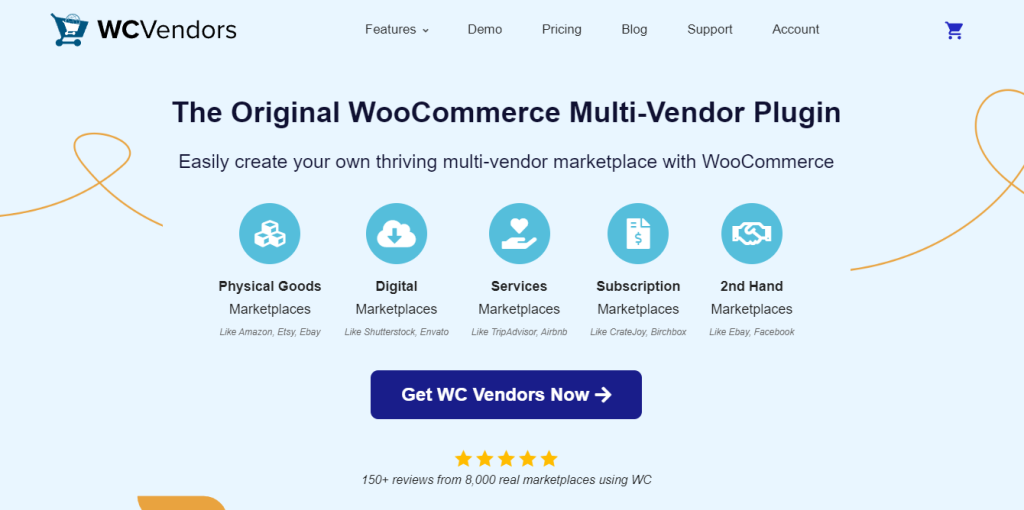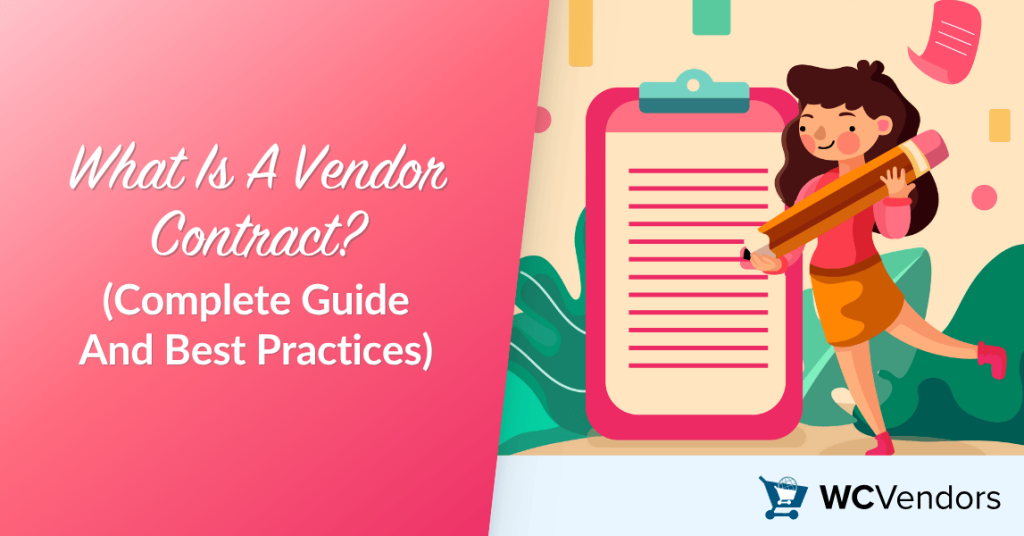
What is a vendor contract, and why does it matter? Vendor contracts are a key part of running a reliable WooCommerce multi-vendor marketplace.
They formalize your agreements with vendors, prevent confusion, and give your platform structure. Vendors use these agreements to list products, receive payments, and take responsibility for their part of the partnership.
Without clear expectations, you risk miscommunication, delays, or compliance issues. Vendor contracts aren’t just for large marketplaces—they’re valuable for anyone managing multiple vendors.
This guide answers the question what is a vendor contract, explains what makes them effective, how to manage them over time, and how WC Vendors supports contract workflows for WooCommerce marketplaces.
Understanding Vendor Contracts
What is a vendor contract? Vendor contracts are a formal agreement between a vendor and your platform that outlines roles, expectations, and responsibilities.
In online marketplaces, especially WooCommerce multi-vendor setups, it’s important to understand what is a vendor contract and how it applies to your platform. Each vendor brings their own products, fulfillment standards, and pricing models. A contract brings consistency and structure to that diversity.
This context helps clarify what is a vendor contract in the specific environment of multi-vendor WooCommerce platforms.
Here’s what’s typically included in a vendor contract:
- Vendor information: Business name, contact details, and tax documentation.
- Goods or services provided: A description of goods, formats, and any requirements.
- Responsibilities: Who handles shipping, refunds, and customer service.
- Timelines: Delivery expectations, return windows, and promotional cycles.
Understanding vendor expectations upfront builds trust and reduces operational friction.
📌 Bonus Tip: If you’re using WooCommerce, vendor contracts can be supported with structured registration processes and automated permissions. That way, understanding vendor responsibilities becomes easier for everyone involved.
What Are The Essential Elements Of An Effective Vendor Contract?
An effective vendor contract should be detailed enough to avoid ambiguity, but flexible enough to support growth. Each clause contributes to a smooth vendor experience and helps enforce marketplace standards.
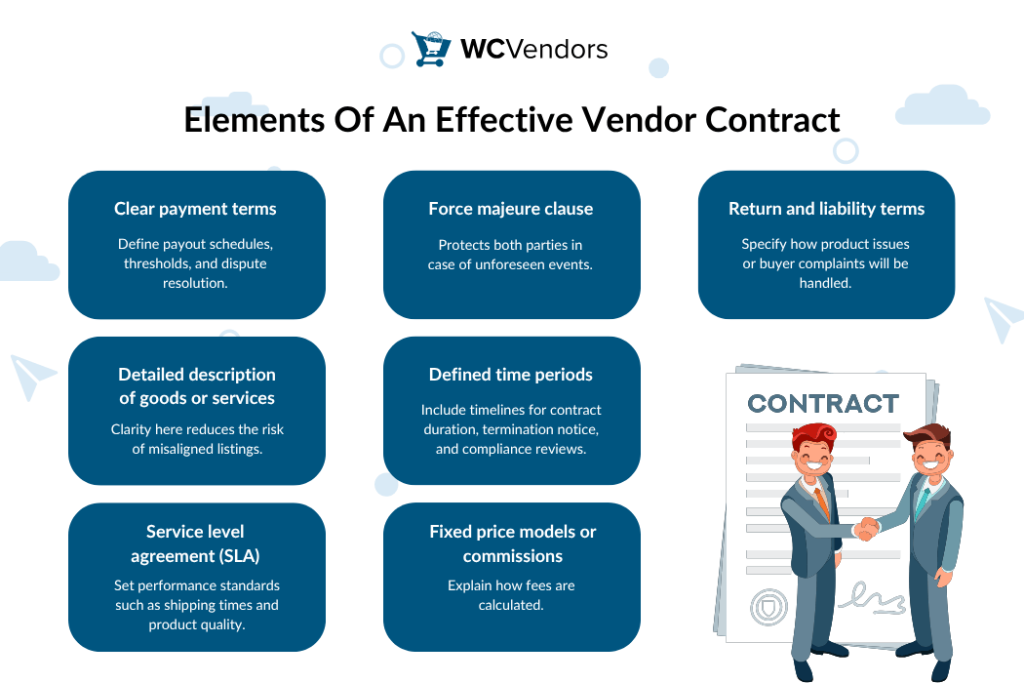
Here are the essential elements to include:
- Clear payment terms: Define payout schedules, thresholds, and dispute resolution.
- Detailed description of goods or services: Clarity here reduces the risk of misaligned listings.
- Service level agreement (SLA): Set performance standards such as shipping times and product quality.
- Force majeure clause: Protects both parties in case of unforeseen events.
- Defined time periods: Include timelines for contract duration, termination notice, and compliance reviews.
- Fixed price models or commissions: Explain how fees are calculated.
- Return and liability terms: Specify how product issues or buyer complaints will be handled.
Including these essential elements leads to more effective vendor contract management, particularly when managing diverse product categories and fulfillment methods. Knowing what is a vendor contract allows you to shape these elements with intention and legal clarity.
What Are The Types Of Vendor Contracts (And When To Use Them)
Not all vendor relationships are the same—so your contracts shouldn’t be either. Choosing the right contract format depends on what your vendors sell and how they operate.
Before choosing a contract type, it’s important to first understand what is a vendor contract and how its structure affects vendor performance and platform consistency.
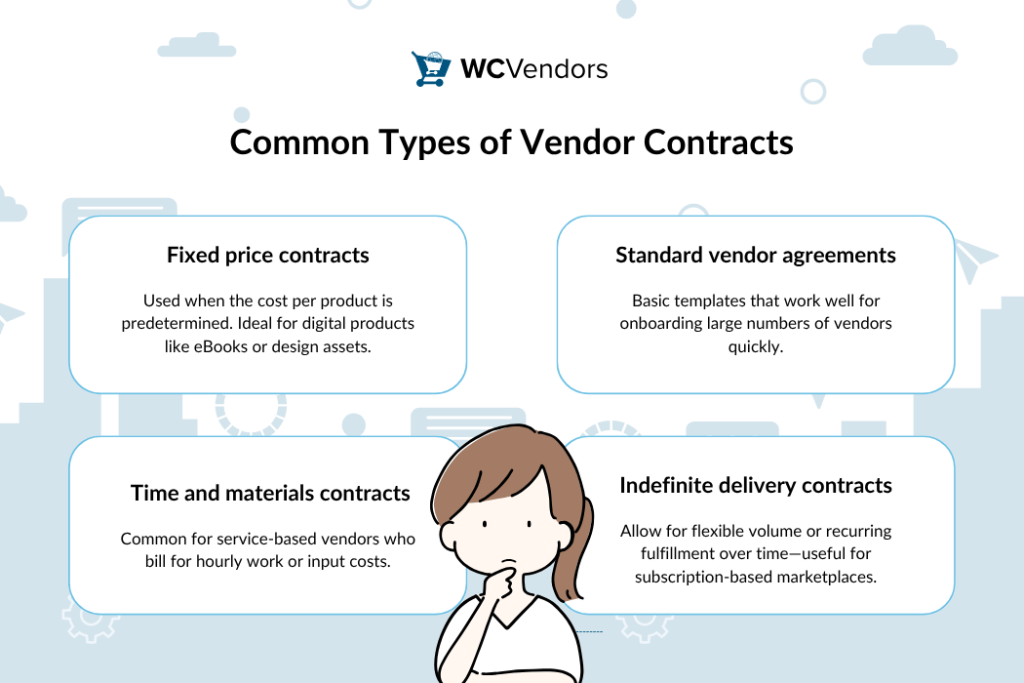
Here are common types of vendor contracts with examples:
- Fixed price contracts: Used when the cost per product is predetermined. Ideal for digital products like eBooks or design assets, where the price and scope rarely change from buyer to buyer.
- Time and materials contracts: Common for service-based vendors who bill for hourly work or input costs. These are often used in marketplaces offering freelance design, writing, or technical support services.
- Standard vendor agreements: Basic templates that work well for onboarding large numbers of vendors quickly. They help establish a baseline for responsibilities, payments, and listings without needing to customize terms for each seller.
- Indefinite delivery contracts: Allow for flexible volume or recurring fulfillment over time, which is useful for subscription-based marketplaces. For example, vendors delivering new content bundles or physical goods on a rolling schedule can benefit from this format.
Each contract type fits different business models. If you’re running a WooCommerce marketplace, most product vendors will use fixed price contracts, while coaches or freelancers may prefer time and materials models.
When evaluating options, knowing what is a vendor contract in each context ensures your agreements match how vendors operate.
What Does Vendor Contract Management Involve?
Once a contract is signed, the work doesn’t stop there. Vendor contract management is an ongoing process that involves tracking, updating, and enforcing agreements as vendor relationships evolve.
This oversight includes drafting agreements, securing approvals, monitoring vendor performance, and reviewing terms periodically. Additionally, it may involve renewing contracts or ending them when necessary, depending on vendor activity and compliance.
As part of a broader contract management strategy, some marketplaces choose to use dedicated tools to stay organized. Alternatively, platforms built with WC Vendors allow owners to manage vendor permissions, onboarding steps, and listing rules directly from the WooCommerce dashboard.
Moreover, maintaining this structure helps vendors stay aligned with platform expectations. It also supports consistent onboarding, clearer accountability, and a more scalable vendor system overall.
What Are the Best Practices For Negotiating Vendor Contracts?
Negotiation doesn’t have to be complicated or adversarial. The goal is to build trust while covering your legal bases. These best practices for negotiating vendor contracts help you strike that balance.

How to negotiate vendor contracts?
Negotiating vendor contracts should be straightforward and goal-focused. The aim is to create agreements that work for both you and your vendors—clear, fair, and ready to support long-term operations.
Here’s how to approach vendor contract negotiations in a practical, thoughtful way:
- Start with a template
Always begin with a contract draft. A solid template gives you structure and saves time. It also helps vendors see that you’ve done your homework and are prepared. - Decide what’s non-negotiable
Be upfront about the terms you can’t bend on. This might include how your brand is represented, data handling rules, or delivery windows. As a result, you set clear boundaries from the beginning. - Use plain language
Legal doesn’t mean complicated. Write like a professional, but aim for clarity. Vendors shouldn’t need a lawyer to understand what they’re agreeing to. - Cover vendor compliance
Be specific about platform rules and what happens if they’re ignored. Whether it’s repeated late deliveries or policy violations, vendors should know the consequences. - Include risk mitigation clauses
Sometimes, things don’t go as planned. Build in protection for issues like missed deadlines, lost shipments, payment delays, or legal liability. This helps reduce tension if problems arise. - Set service level expectations
Define what good performance looks like. For example: “Orders must ship within 3 business days” or “Product pages must include at least two images and a full description.” This avoids mismatched expectations later on.
📌 Bonus Tip: Don’t skip vendor risk management. If your marketplace involves licensed content, regulated products, or large-volume transactions, assess risks per vendor before you sign.
By following these steps, you’re not just writing a vendor contract. You’re laying the foundation for a more stable, efficient marketplace. And again, if you’re still wondering what is a vendor contract, think of it as a tool for communication, accountability, and scalability.
How Does WC Vendors Support Effective Vendor Contract Management?
Using WC Vendors on your WooCommerce marketplace gives you control over how vendors interact with your store without requiring custom legal tools.
Here’s how it supports effective vendor contract management:
- Set vendor policies in the dashboard
Define listing requirements, product visibility rules, and vendor permissions to reflect the terms of your vendor agreement. - Add onboarding requirements
Require agreement to terms and policies during vendor registration. Collect essential documentation like tax IDs or business licenses if needed. - Use flexible commission structures
Set vendor commissions by category, vendor level, or membership tier—making it easy to apply different earning terms across your vendor base. - Control access to vendor tools
Limit capabilities such as product publishing or shipping settings until vendors meet specific criteria or acknowledge platform rules. - Track compliance through reports
Monitor vendor performance over time using the built-in reporting system to help enforce ongoing compliance.
What great vendor management looks like (Sonniss case study)
According to a case study published by WC Vendors, effective vendor management using structured onboarding, listing permissions, and automated payouts helps reduce support requests.
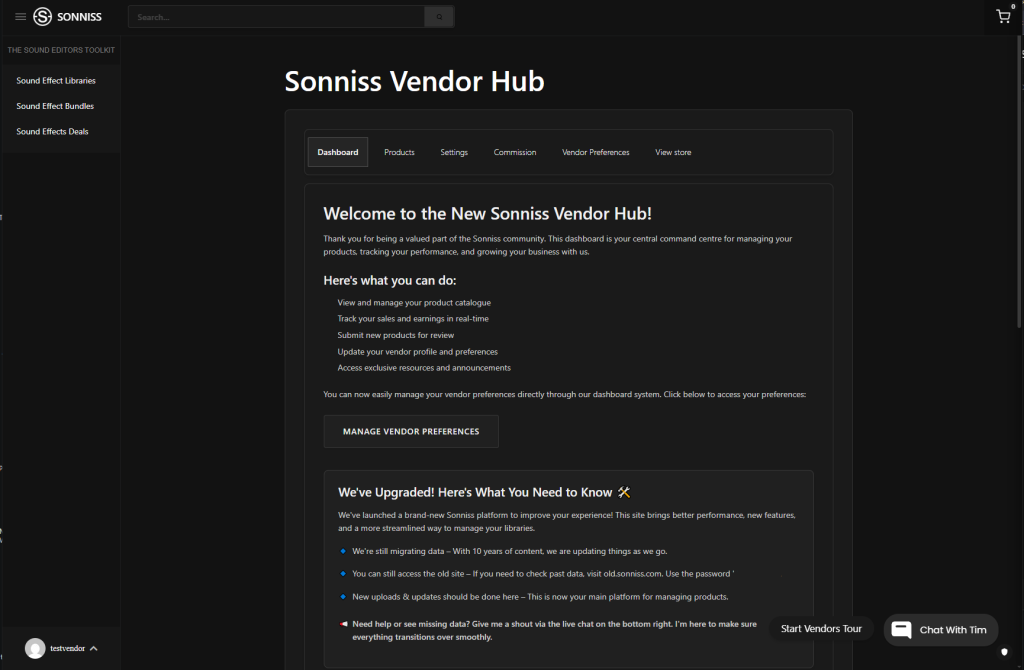
Sonniss, a digital audio marketplace for professionals, used WC Vendors to manage hundreds of contributors while maintaining strict quality standards. With custom onboarding workflows, detailed submission fields, and flexible commission settings, they streamlined vendor operations and scaled their platform without adding complexity.
This example shows how a focused vendor system can support growth, even in specialized marketplaces like audio.
Conclusion
Once you understand what is a vendor contract, you’ll see it does more than offer legal coverage. They shape how your marketplace operates by encouraging fairness, professionalism, and transparency from the beginning.
When expectations are clearly defined, it’s easier to avoid misunderstandings, minimize support issues, and build lasting trust with your vendors. If you’re running a WooCommerce multi-vendor site, taking the time to outline responsibilities and processes can save you a lot of trouble later.
To recap, here’s what you need to get right:
- Understanding Vendor Contracts in Online Marketplaces
- Key Elements of a Vendor Contract
- Types of Vendor Contracts
- Vendor Contract Management
- Best Practices for Negotiating Vendor Contracts
- How WC Vendors Supports Effective Vendor Contract Management
If you’re building a vendor-powered marketplace and want more control over how vendor relationships are managed, WC Vendors gives you the structure and tools to enforce vendor terms through permissions, onboarding fields, commission settings, and more.
You can explore the WC Vendors demo site to see how it works in action, or explore our plans and features to get started.
Frequently Asked Questions
What is a vendor contract used for?
Vendor contracts are used to define the expectations, responsibilities, and legal boundaries between vendors and the marketplace. They protect both parties and ensure consistent operations across your platform.
What should be included in a vendor agreement?
Include vendor information, product or service scope, payment terms, delivery timelines, force majeure clauses, and service level agreements. These form the basis of a clear working relationship.
What are the best practices for negotiating vendor contracts?
Use simple language, offer flexibility where appropriate, and define non-negotiable standards upfront. Ensure you include vendor compliance terms to prevent future issues.
What is the purpose of vendor compliance contracts?
Vendor compliance contracts exist to ensure vendors follow your platform’s operational and legal rules. They support product quality, service consistency, and regulatory alignment.
How do I create vendor contracts?
Start with a contract template or checklist that covers essential elements like vendor responsibilities, payment terms, product guidelines, and timelines. Customize the agreement based on the type of vendor and the services or products they offer. Then, review the draft with legal counsel if needed, and finalize it with clear signatures and agreement from both parties. You can also use e-signature tools or PDF forms to streamline the signing process.
What’s the difference between a vendor contract and a supplier agreement?
A vendor contract typically applies to service providers or digital sellers, while a supplier agreement focuses on the physical supply of goods. Both outline responsibilities, pricing, and terms, but they differ in scope.
Supplier agreements are more common in manufacturing or inventory-heavy industries and include clauses around warehousing, stock levels, and delivery. Vendor contracts are broader and often used in online marketplaces, covering listing rights, payouts, and service expectations.
Can I write a vendor contract without a lawyer?
Yes, you can write a vendor contract without a lawyer, but legal review is recommended for complex terms or high-risk industries.
Using templates or contract generators is fine for basic agreements, especially in low-liability digital marketplaces. However, consult a lawyer if your contract includes intellectual property, international vendors, or sensitive customer data.
Do I need a separate contract for each vendor?
Not necessarily. You can use a standard agreement for multiple vendors, but adjustments may be needed for different product types, services, or jurisdictions.
A master vendor agreement with addenda is a common approach. It ensures consistency while allowing flexibility for unique terms like commission rates, delivery windows, or exclusive rights.
